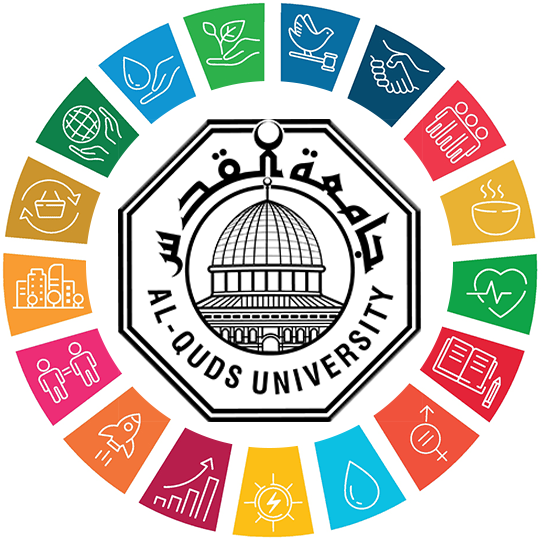Progress on SDG 12 (Responsible Consumption and Production):
Al-Quds University accommodates SDG 12 (Responsible Consumption and Production) in their curriculum and innovative activities posed as university initiatives.
The most important is the teaching and training of students in Environmental Sciences, Environmental Management and Sustainable Development. In preparing the university’s curriculum, the core courses on the disruptive practices of unsustainable consumption and production, and responsible consumption practices, were prioritized. Other ancillary courses on resource efficiency, waste management, and the circular economy were also included. This secures students in obtaining jobs of great social value in their professions.
Al-Quds University is also addresses valuable and extensive research in the domain of unsustainable consumption and production, resource efficiency, waste, life cycle analysis, and sustainable supply chains. In addition to the academic value of this research, the knowledge constructed from these studies is highly valuable in the world and in making evidence-based decisions within policies and frameworks.
In Al_Quds University’s case, and for operationalization purposes, collaboration with the industry, the public sector, and NGOs are for addressing sustainable consumption and production. As a result of Joint Research and Collaborative Knowledge Exchange, the University was capable of providing technical support and assistance in the construction and operationalization of sustainable solutions.
Operationalization of 12th SDG was incorporated and integrated with University’s Values. This incorporation is highlighted and portrayed with positive waste disposal, sustainable procurement, and resource-efficient infrastructure embedded within University’s Values. These actions posture University’s responsible waste disposal philosophy, and as a result, Set positive Environmental practice and Footprint for waste disposal for other institutions to Environmental practice and Footprint for waste disposal.
Al_Quds University also incorporates community outreach and capacity building as University strategies. These University strategies include conducting responsible consumption and production community outreach and capacity building. These strategies incorporated waste disposal, recycling, energy efficiency, and sustainable agriculture, and he community was empowered to adopt sustainable consumption practices.
Al-Quds University also focuses on advocacy and policy initiatives regarding the promotion of sustainable consumption and production at the local, national, and international levels. This type of advocacy is important in shaping more generalized policies and enabling the adoption of sustainable consumption and production systems.
The University also promotes a strong entrepreneurial and innovative culture around sustainable consumption and production. Al-Quds University offers systems for the creation of new, sustainable products and services through considerable mentorship, entrepreneurial guidance, and innovative funding around this important area of persistent growth.
The unsustainable patterns of production and consumption negatively impact the natural resources and the environment at a global level and will continue to do so. As a planet, we have utilized the natural resources irresponsibly and have consumed more than our global resources can provide. sustainable patterns of production and consumption will mitigate the damage we have caused to the planet, ensure the environmentally sound management of chemicals and all wastes through their life cycles as per the international agreement and frameworks, and reduce the release of these substances to the air, water and soil to improve human and environmental health.
Al-Quds University appreciates the value of sustainability as it relates to responsible patterns of consumption and production and promotes enthusiastic engagement in such practices. Al-Quds University engages in SDG 12 in the following ways:
Al-Quds University promotes the attainment of undergraduate and graduate degrees in environmental sciences, management, and sustainable development, to support the development and practicing of sustainable consumption and production models. Al-Quds University equips students to become practitioners in the field, centering on resource use and efficiency, waste management and streaming of the circular economy.
Al-Quds University promotes research on sustainable consumption and production patterns, resource use efficiency and effective waste management, life cycle assessment and alternative sustainable supply chains. These initiatives advance understanding of the practices and development of evidence based policies to foster sustainable consumption and production.
Al-Quds University collaborates with partners from different sectors on challenges related to consumption and production sustainability. These initiatives lead to joint research, workshops, and technical support initiatives which foster the adoption of sustainable consumption and production practices.
Sustainable Campus Initiatives: The university aims to endorse responsible consumption alongside the efficient use of resources. The university has focused waste management, sustainable procurement for faculty, staff, and students, and “green” infrastructure. The sustainable university footprint is an example to other industires, institutions, and organizations.
Community Outreach and Capacity Building: Community outreach to promote responsible consumption is an Al-Quds University outreach program. Community education and training programs on waste management, recycling, energy use, and sustainable farming practices promote a shift to sustainable living and practices. Al-Quds University promotes and advocates for sustainable practices and for responsible consumption.
Advocacy and policy Development: Al-Quds University advocates for courses of action and strategies that support responsible consumption and production at the local, national, and international levels.
Promoting Entrepreneurship and Innovation: Al-Quds encourages entrepreneurship and the university resources and offers support for students, faculty, and graduates to build social enterprises around sustainable consumption. Al-Quds promotes innovation around the social enterprise, “green” product, and “green” service formation through university resources, mentorship, workshops, networking, and funding.
In summary, Al-Quds University is committed to SDG 12 by integrating teaching, research, partnerships with the private sector, sustainable campus practices, community outreach and empowerment, advocacy and policy work, and the promotion of entrepreneurship and innovation. The university’s emphasis on responsible consumption and production is fundamental to the promotion of environmental sustainability, social equity, and wellbeing.
